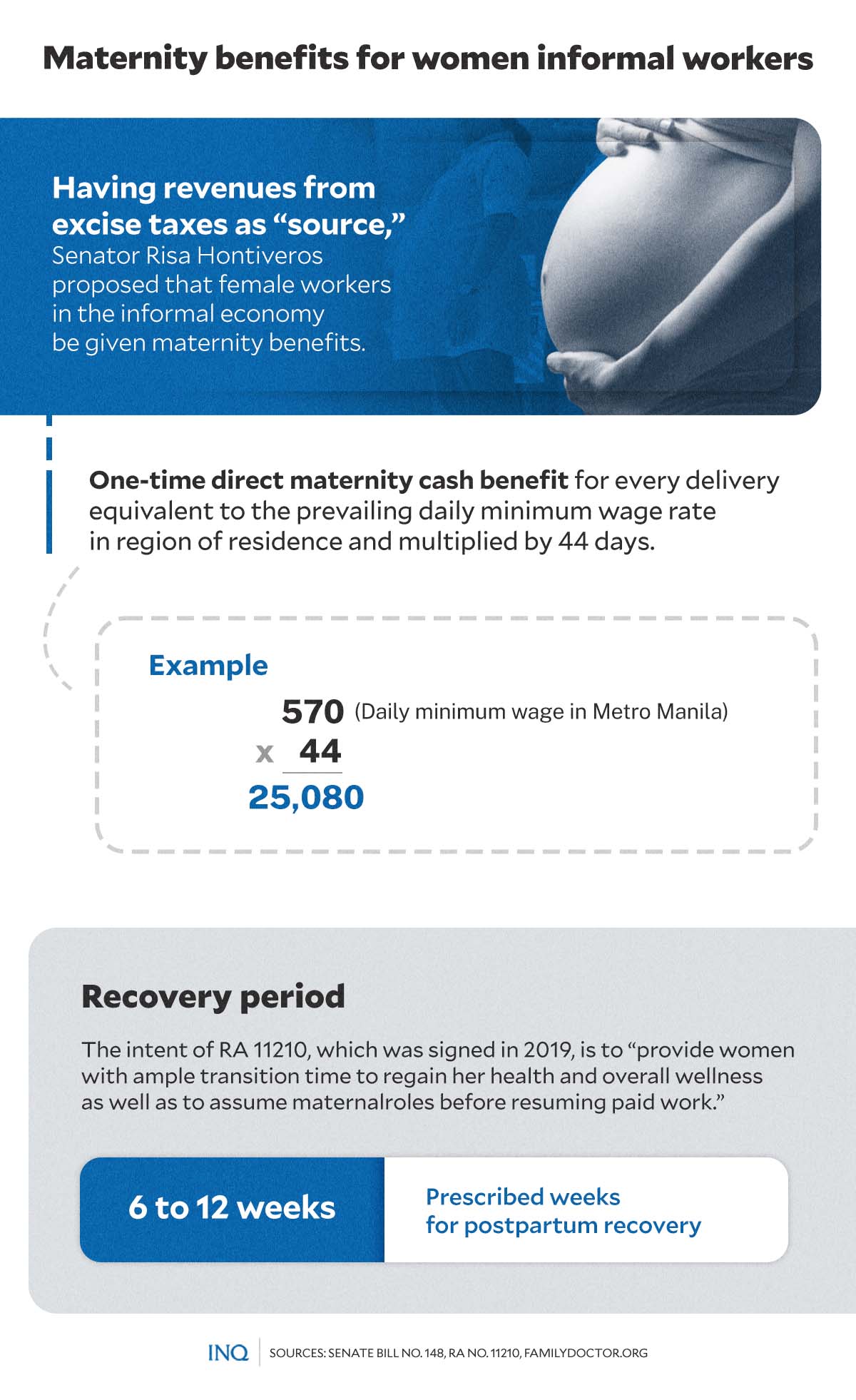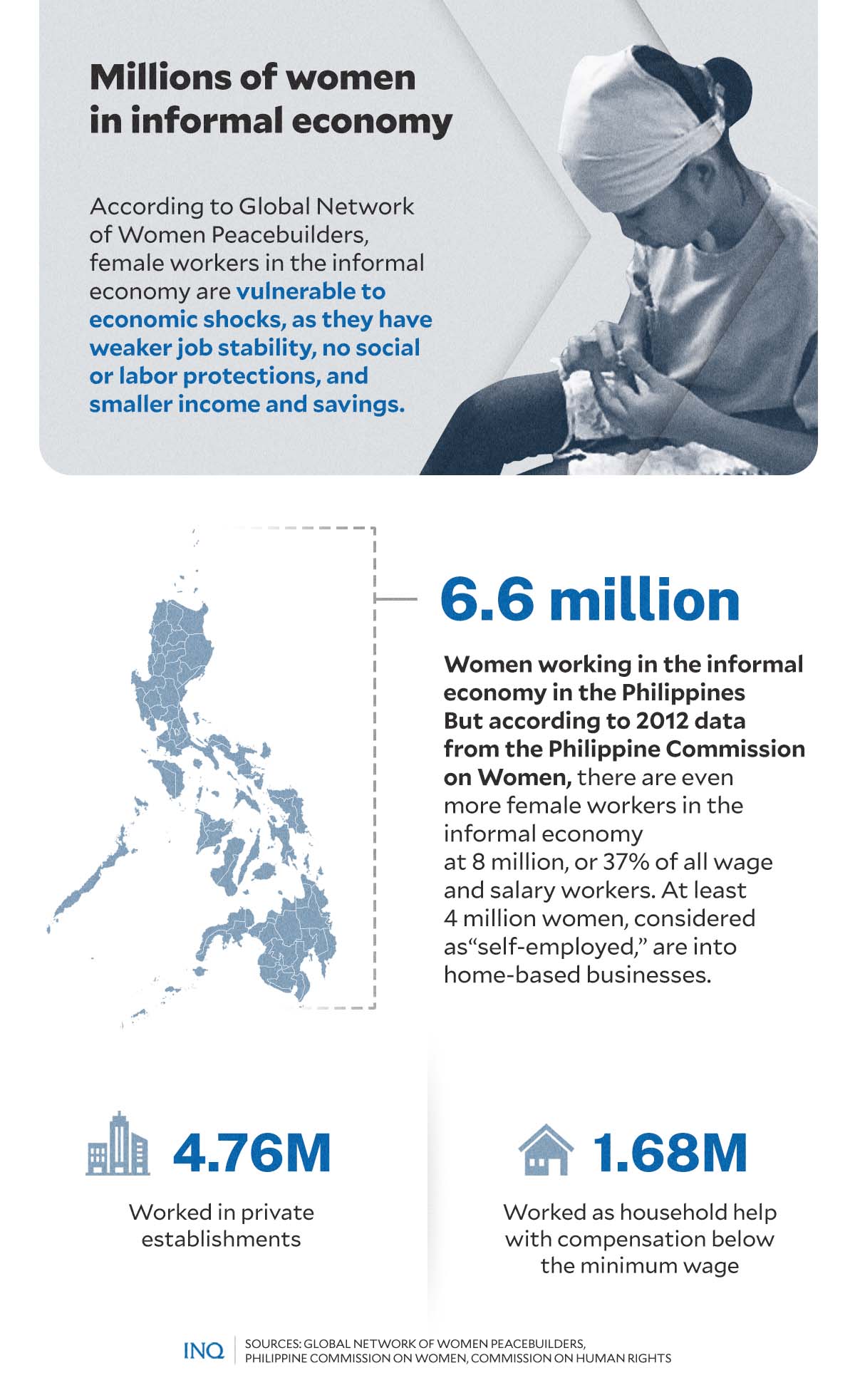Maternity benefits pushed for women workers in informal sector
MANILA, Philippines—A big share of the almost 50 million “employed” Filipinos are women engaged in informal work and as stressed in Senate Bill (SB) No. 148, they deserve maternity benefits, too.
According to a report by the Commission on Human Rights (CHR), most of the female workers in the informal economy are home-based business owners, home-based subcontract workers, and street vendors.
However, while Republic Act (RA) No. 11210, or the Expanded Maternity Leave Act, has been beneficial to millions of female workers, a huge swathe of the workforce, as well as young dependents, do not yet enjoy the benefits of the law.
READ: Duterte signs into law longer maternity leave benefits
According to Sen. Risa Hontiveros, they are the women in the informal economy who are non-members of the Social Security System (SSS), like sari-sari store owners, handicraft and tool assemblers, street vendors, and farmers.
This was the reason she filed last year SB No. 148 to seek the amendment of RA No. 11210 “to provide a maternity cash benefit worth the daily minimum wage times 44, or the minimum wage of two months.”
RELATED STORY: Menstrual leave benefits all
So in Metro Manila, where the minimum wage is P570 a day, the cash benefit will amount to P25,080, while in the Bangsamoro Autonomous Region in Muslim Mindanao, it will be P15,004.
Once the bill is signed into law, Section 11 of RA No. 11210, will be replaced with this new one:
Section 11. Maternity Benefits for Female Workers who are Non-Members of the SSS—Female workers who are neither voluntary nor regular members of the SSS shall receive, through the Department of Social Welfare and Development, a one-time direct maternity cash benefit per delivery equivalent to the prevailing daily minimum wage rate in her region of residence multiplied by 44 days.
As explained by Hontiveros, the money for this “will be sourced from sin taxes.”
She said “they (female workers in the informal economy) are not regular members of [the] SSS because they are not employees and they, too, cannot afford to become voluntary members because they only earn a meager income.”
READ: Expanded maternity leave law seen boosting SSS benefit payouts
This was also stressed by the Alliance of Workers in the Informal Economy, with its president, Susanita Tesiorna, saying that non-contributing members of the SSS and the Philippine Health Insurance Corp., who can’t afford regular premiums, should be granted maternity cash benefit.
Women in informal work
Based on the result of the latest Labor Force Survey conducted by the Philippine Statistics Authority (PSA), there were 48.58 million employed Filipinos in March 2023—28.22 were male while 20.36 were female.
However, there were not enough data on the informal economy, except for the percentage of private household workers (3.9 percent), paid family workers (0.4 percent), self-employed (27.9 percent), and unpaid family workers (8.3 percent).
As Tesiorna told INQUIRER.net via FB Messenger, the last Informal Sector Survey (ISS) was conducted in 2008. This was never done again because of supposed funding problems, she said.
Based on the result of the 2008 ISS, there were about 10.5 million “informal sector operators,” or those that are self-employed without any paid employee or employer in own-family operated farm or business.
Out of the 10.5 million, 66 percent is male while 34 percent is female.
But in the report published by the CHR, which cited a more recent data from the Philippine Commission on Women (PCW), there were 8 million female workers in the informal economy in 2012.
The PCW said the 8 million was 37 percent of all wage and salary workers that year—4.76 million worked in private establishments while 1.68 million worked as household help with compensation below the minimum wage set by the government.
Likewise, some 4 million self-employed women were into home-based businesses.
According to the Global Network of Women Peacebuilders, female workers in the informal economy are vulnerable to economic shocks, as they have no job stability, no social or labor protections, and smaller income and savings.
Social protection needed
With an estimated 250,000 women in the informal economy that give birth every year, Hontiveros said enacting the bill into law is “very important,” stressing that “the impact [of the law] will be significant for them.”
As stated in a study by Gautam Bhan et. al., which was published by the National Center for Biotechnology Information, the informal economy crosses a range of sectors, with street vending, domestic work, and waste picking as the most common.
It was stressed that “for these workers, caring for themselves and their children presents unique challenges,” especially for mothers who need to take care of her infant while providing for the family.
“Mothers who work in the informal sector must continue to bring income to the household, care for their physical and mental health after childbirth, and attempt to exclusively breastfeed their infant and provide nurturing care.”
The problem, however, is that “they must all do this while working without any formal labor protection such as maternity leave” since there are only a few public or private social protection initiatives for them.
Looking back, Hontiveros, chair of the Senate Committee on Women, Children, Family Relations and Gender Equality, also proposed the same in 2021 with SB No. 2175.
She stressed then that while the engagement of pregnant women in the informal economy is a display of their resilience, “we should not forget that pregnancy is one of the most important phases in the life of a woman.”
“Giving importance to their rights means promoting the future of every Filipino household” because “if the working mother has a maternity leave, she will have enough time to take care of her infant.”
She said “the mother will have more time to breastfeed and attend to the rest of the needs of her infant.”
Beneficial to economy, too
According to SB No. 148, peer-reviewed research has quantified the economic toll that inadequate breastfeeding takes on individuals, communities and countries, including the Philippines.
It was found that the cost of inadequate breastfeeding to the health care system in the Philippines is about $16.3 million a year, and future cognitive losses of $2.3 billion a year owing to reduced development and earning potential can be expected.
“The costs of infant formula also significantly reduce a family’s disposable income,” the bill said.
The bill stated that providing a maternity benefit to women workers in the informal economy equivalent to about $350 for every mother is paltry compared to the potential economic benefits of improving breastfeeding rates at population level.
This, as “the estimated cost of a 14-week maternity leave is only 5 percent of the cost of not breastfeeding in the Philippines.”
“Therefore, a maternity benefit for women workers in the informal economy is not just a social justice measure and an important way to address the multiple burdens and increased vulnerabilities of women who are also mothers and informal workers, it also leads to demonstrable and quantifiable health outcomes at the population level.”
According to a study conducted by Valerie Ulep et. al., a non-contributory maternity cash transfer to informal sector workers could provide health benefits by helping mothers meet their breastfeeding goals.
It was stated that the annual financing needed for implementing maternity cash transfer program in the Philippines ranges from a minimum scenario of $42 million for a 14-week maternity cash transfer to a more ideal scenario of $309 million for a 26-week maternity cash transfer.
“The latter is financially feasible as it is equivalent to less than 0.1 percent of the country’s gross domestic product substantially lower than the share cost of not breastfeeding (0.7 percent),” said the study.
RELATED STORY: Expanded Maternity Leave Act: ‘A victory for women, families’
TSB
Subscribe to INQUIRER PLUS to get access to The Philippine Daily Inquirer & other 70+ titles, share up to 5 gadgets, listen to the news, download as early as 4am & share articles on social media. Call 896 6000.


